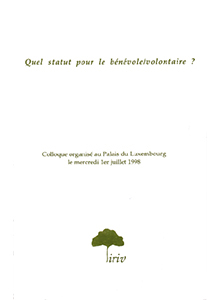Which status for the volunteer ?
Eve-Marie Halba, Bénédicte Halba (eds) et Joël Balavoine, Jean-Pierre Balligand, Jean Bastide, Christophe Borgel, Raymond Caire, Brigitte Clavagnier, Gérard Couturier, Dominique Delpirou, Patrick Duong, Jacques Lecugy, Philippe Malaurie, Anne Marchand, Catherine Mundubeltz, Hugues Portelli, Michèle-Laure Rassat, Jean Savatier, Bernard Seillier, Cécile Sportis, Jean-Pierre Sueur
- Publication : 1998
- iriv
- 95 pages
- ISBN : 2-9513188-0-4
Why do volunteers exist ?
For the sceptic, a volunteer may be incompetent and even dishonest (Philippe Malaurie) ; a volunteer may be clumsy (Anne Marchand) ; a volunteer may also compete with paid staff (Jean Savatier) ;
For the disillusioned, volunteerring is an easy way for the Government to save money (Michèle-Laure Rassat) ; when the volunteer is getting skilled , he/she may become a second -class paid staff (Hugues Portelli);
For the enthusiastic, the volunteer plays a major role in society ; he/she supports the oustsiders (poor, homeless, sick or handicapped people) ; he contributes to the International humanitarian support .
Is a status conceivable for the volunteer ? There is no legal framework for the volunteer, but some dispatched refererences in several texts. A status would lead to a better recognition (Christophe Borgel et Hugues Portelli) ; a training for volunteers (Jean Bastide and Jean-Pierre Sueur); a much higher involvement of paid staff in volunteering especially with the increase in free time (Dominique Delpirou); a minimum protection for volunteers concerning abuse in repayment of back taxes (Brigitte Clavagnier) and concerning the penal responsibility (Jean-Pierre Balligand).






























































